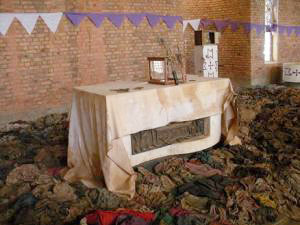The Swiss-born theologian Father Hans Kung, notes that there are other scandals than sex within the church: “Time and again we see leaders and members of religions incite aggression, fanaticism, hate, and xenophobia - even inspire and legitimate violent and bloody conflicts.”


The Swiss-born theologian Father Hans Kung, notes that there are other scandals than sex within the church: "Time and again we see leaders and members of religions incite aggression, fanaticism, hate, and xenophobia - even inspire and legitimate violent and bloody conflicts.”
His opinion is especially relevant today, when the Pope admits the problem is from within. If the "Holy Father” had listened to people like Kung, maybe the situation would be better.
Instead, in 1979 the Vatican’s Congregation for the Doctrine of the Faith revoked permission for Father Kung to teach as a Catholic theologian.
That did not silence him. On April 16, 2010 Fr. Kung wrote an open letter to the world’s Catholic bishops accusing Pope Benedict of betraying the modernizing reforms proposed by the Vatican Council II, and engineering, a "worldwide system of covering up cases of sexual crimes committed by clerics.” The last being when he was a Cardinal.
A week later, the April 23 edition of L’Osservatore Romano carried a story by Pier Giordano Cabra on its front page responding to Kung’s allegations.
Humbly, Cabra says: "perhaps if your letter had breathed a bit more of the hymn to charity, it would have turned out to be a more elegantly evangelical gesture of congratulations” for Benedict’s 83rd birthday and fifth anniversary as Pope, as well as "a more fruitful contribution to the church that is suffering for the weakness of her sons.”
Earlier in March, Kung had said that from 1981 to 2005, on grounds of discretion, the "secretive” Vatican department of Doctrine claimed exclusive jurisdiction for all significant cases of sexual offenses by clerics. All of these cases landed on the desk of its prefect, Cardinal Joseph Ratzinger.
To be precise Kung said in on May 18, 2001, Ratzinger sent to all the bishops around the world a solemn epistle concerning serious crimes (Epistula de delictis gravioribus), in which cases of abuse were put under "papal secrecy” (Secretum Pontificium), the violation of which entails severe ecclesiastical penalties.
He raised serious concerns: "Do not the bishops themselves bear responsibility for the decades-long practice of covering up cases of abuse, often taking no more serious measures than relocating the perpetrator under the veil of secrecy? Have the cover-up specialists of the past suddenly become credible un-coverers? Must not independent commissions be established to deal with such cases?”
Cry Rwanda
In Rwanda, the most serious crime is not the clergy in "sex scandals”. It is the church’s role in genocide, and now its activism in denial. But unfortunately, this is of little concern to the Vatican.
Despite the horrendous genocide against the Tutsi in 1994, mass murders in churches, and the involvement of churchmen in this odious crime, the Catholic Church appeared to have lost nothing.
It maintained its dynamism and vitality, which was evident in mass celebrations and other ecclesiastical activities.
The significance of the 1994 genocide in Rwanda was not evident at the Vatican. On Christmas day, 1994 Pope John Paul II offered his Christmas wishes from the central loggia of St Peter’s Basilica.
The Pope’s words on Rwanda, reported by L’Osservatore Romano on January 4, 1995, were elusive, disingenuous, and at best denialist. The Pontiff avoided the word genocide and the ideology behind it; instead he described Rwanda as one of several "new centres of tension,” affected by "persistent forms of selfishness and violence” and the "tragedy of war” caused by "irrational passions.”
Historically, before 1994 the Catholic Church leaders in Rwanda had made deals with the different regimes which succeeded each other since the colonial period, adopting into their thinking the dominant ideologies, despite their injustices and their abominations.
After the genocide, like other institutions with influence, the church had a responsibility, for the future of Rwanda, to develop a new awareness and to confront the ideology of ethnic hatred that had led to the genocide.
It was an opportunity, for the Church to confess and to make up for its faults of the past, and to commit itself resolutely to a new stance more in conformity with the gospel and with justice and truth.
Such an exercise would have allowed the institution to restore its credibility and regain moral influence in a society desperately in need of harmony.
Regrettably, certain authorities in the Church opted for escapism and to maintain its ideological status quo, at any price. It treated the new government which had defeated the genocidaires as a scapegoat, and reduced it, wrongly, to the Tutsi and the Rwanda Patriotic Force (RPF).
This attitude was reflected in the official documents of the Episcopal Conference of Rwanda (CEPR) and of the office of the Apostolic Nuncio in Rwanda.
They exhibited enormous complacency, and a desire to veil the evidence of the historical responsibility of the church in the genocide. This involved a concerted disinformation campaign reflecting extraordinary hypocrisy, and virulent hostility to the government and to people who were ready to tell the truth about what had happened.
This church’s lack of courage and humility made it develop what philosopher Bertrand Russell, in his book "The Conquest of Happiness” termed "persecution mania” which he says is "a recognised form of insanity.”
To Be Continued…


